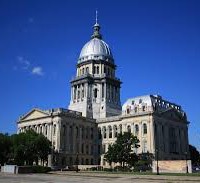Winter is coming … got salt?
- Details
- Published on Monday, 02 November 2015 17:05
By Mark Fitton
Illinois News Network
Smaller Illinois cities and counties are hoping for an exceptionally mild winter or a breakthrough in the state budget impasse.
Smaller communities tend to have fewer sources of revenue and often need their share of motor fuel tax money to keep roads clear in the winter, said Brad Cole, executive director of the Illinois municipal League.
“Many municipalities do, in fact, use these funds to pay for salt, plowing and overtime to help keep the roads safe,” Cole said.
The local government share of motor fuel taxes is being held up by the lack of a fiscal year 2016 state budget.
Illinois taxes gasoline at 19 cents and diesel fuel at 21.5 cents per gallon. Several specific statewide funds named in statute get their cut, and the rest of the fuel tax money is divided for road projects and maintenance, with roughly 46 percent going to the state and 54 percent going to local governments.
Gov. Bruce Rauner’s administration says that without a signed appropriation bill, the state has no legal authority to disburse the money. And that’s putting many local officials on edge as the calendar hits November and the state enters its fifth month without a budget.
“The lack of pay-over puts us in an extreme predicament this winter and for the next year as to how we’re going to fund projects and how we’re going to do basic maintenance functions like plowing and patching,” said Freeport Mayor Jim Gitz.
Gitz’s community in northwestern Illinois typically gets upward of $600,000 a year and it will feel the pinch this winter without it, he said.
Tazewell County Engineer Craig Fink said his county has spent conservatively and, as a result, can probably get through the winter without a major scare. But very rural counties and many small townships may be in trouble, he added. “The more rural the community, the more highly dependent it’s going to be on user fees,” he said.
Some of the rural townships probably will head into the winter with zero-balance in accounts they’d normally use to fund salting and plowing, Fink said.
Effingham County Board Chairman Jim Niemann said several truck stops generate a lot of motor fuel tax revenue for his county, and the lack of those and other payments from the state means the county will deplete its financial reserves by the spring if nothing changes.
“If we don’t see some funding out of Springfield, either out of the Local Government Distributive Fund or the Motor Fuel Tax Fund, we’ll be hitting our reserves for certain,” Niemann said.
While the state has been distributing the income tax portion of the Local Government Distributive Fund by way of continuing appropriation, it has not been sending the local-government share of state sales tax. The comptroller needs a separate appropriation to distribute the local-government share of state sales tax, said Rich Carter, spokesman for comptroller Leslie Geissler Munger. To date, the state is holding $38 million in 2016 local-share sales tax revenue.
The Illinois Municipal League is asking local governments to pass resolutions and send letters urging the state’s leaders to release money set aside for local governments. Those funds include the motor fuel tax money, as well as local-government portions of the state’s gambling revenue and money to fund 911 dispatch centers, which is collected via telephone surcharges.
“The dollars we are talking about are not general revenue funds,” said Cole. “These are dollars that do not impact the state general-funds budget. This is pass-through money that is charged locally, collected by the state and then returned to communities.”
The Municipal League supports legislation to release the non-general fund money to local governments. Among the pending legislation that could do that are House Bill 4305 by Rep. Martin Moylan, D-Des Plaines, and House Bill 4320 by Rep. David Harris, R-Arlington Heights.
To date, the Republican governor’s administration has opposed paying out the non-general fund dollars.
“The state lacks the appropriation authority to distribute money in these special funds because the General Assembly failed to pass a balanced budget,” Rauner spokeswoman Catherine Kelly said in an emailed statement.
“Governor Rauner also proposed reforms that will help local governments by allowing them more flexibility to make decisions that will best serve their communities,” she said. “Unfortunately, the majority party refuses to consider any of his proposals that would benefit local governments.”
For its part, the Illinois Department of Transportation does have a nearly topped off supply of road salt for the highways it’s obligated to clear.
“We currently have approximately 460,000 tons on hand statewide. That’s just about 100 percent of our available capacity,” IDOT spokesman Guy Tridgell said in an email.
Tridgell said IDOT also has contracts in place to obtain an additional 592,000 tons, if needed, and does not anticipate delivery problems.
The state anticipates its salt needs based on average use from the previous five years. As Illinois winters can vary tremendously, so does the need for road salt.
The state used as little as 235,000 tons in 2011-2012, for instance, but as much as 839,000 tons in 2007-2008, according to IDOT.
Winter is coming … got salt?
Small communities worried by lack of payments
By Mark Fitton
Illinois News Network


















































